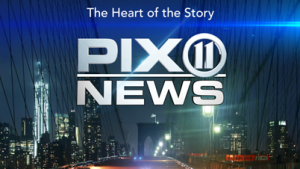 Senate Minority Whip Dick Durbin tells roughly 500 broadcasters at NAB’s State Leadership Conference that they need to stand strong in the face of President Trump’s press bashing. “As local broadcast news organizations, you have a greater ability to defend the integrity of the media because your listeners and viewers trust you more than just about any other media.”
Senate Minority Whip Dick Durbin tells roughly 500 broadcasters at NAB’s State Leadership Conference that they need to stand strong in the face of President Trump’s press bashing. “As local broadcast news organizations, you have a greater ability to defend the integrity of the media because your listeners and viewers trust you more than just about any other media.”
More than 50 journalists, lawyers, media rights advocates, and First Amendment stakeholders came together in Washington last week with a common interest in protecting freedom of the press and securing rights granted by the First Amendment.
Pray For The First Amendment. Now.
 Erik Wemple: “Even as he campaigned for president, Donald Trump has threatened legal action against the Associated Press and the New York Times. He has stiff-armed media organizations on credentials, vowed to loosen libel law to make it easier for guys like him to sue media outlets, ridiculed media outlets and individual reporters at rallies, and much more. Asked in a recent New York Times interview whether he’d make good on his threat on libel laws, Trump answered, “I think you’ll be happy.”
Erik Wemple: “Even as he campaigned for president, Donald Trump has threatened legal action against the Associated Press and the New York Times. He has stiff-armed media organizations on credentials, vowed to loosen libel law to make it easier for guys like him to sue media outlets, ridiculed media outlets and individual reporters at rallies, and much more. Asked in a recent New York Times interview whether he’d make good on his threat on libel laws, Trump answered, “I think you’ll be happy.”
Media Factored Into Trump Win In Many Ways
 Trump’s masterly use and abuse of the media helped propel him to victory in the race for the White House. While bashing reporters at his rallies as liars and closet Democrats, he threatened to crack down on big media mergers and weaken protections against libel suits. At the same time, he put the media to work for himself by commanding their attention at every turn.
Trump’s masterly use and abuse of the media helped propel him to victory in the race for the White House. While bashing reporters at his rallies as liars and closet Democrats, he threatened to crack down on big media mergers and weaken protections against libel suits. At the same time, he put the media to work for himself by commanding their attention at every turn.
Trump’s Media Enmity Threatens A Free Press

Columbia University and The Knight Foundation are teaming up to create the First Amendment Institute at Columbia University, a $60 million initiative dedicated to thinking through the thorny questions of First Amendment case law in the digital age — and going to court if necessary to preserve the right to free speech.
Facebook Needs To Stand Up For 1st Amend.

According to some legal experts, this week’s firing of WTAE Pittsburgh anchor Wendy Bell over her Facebook posting does not violate her right to freedom of speech. According to attorney Sam Cordes, the First Amendment forbids the government to infringe on individuals’ free speech rights, with limited exceptions. “But it says nothing about a private employer.”
As Apple tries to fend off government demands for access to iPhone content, the company is leaning on free speech arguments as a key part of its defense in a California courtroom. On the other end of the country, 10 separate lawsuits have piled up this year against net neutrality rules, with both sides claiming First Amendment rights in this long-running dispute over the federal regulation of Internet service.
Scalia’s Media Legacy: More Good Than Bad

The case, Elonis v. United States, will be argued before the Supreme Court this fall and will require the court to consider how the First Amendment applies to social media. Adam Liptak looks at how the court has ruled in other cases that involved “emerging technology before its role in society has become clear.”
 The 9th U.S. Circuit Court of Appeals ordered a new trial in a defamation lawsuit brought by an Oregon bankruptcy trustee against a Montana blogger who wrote online that the court-appointed trustee criminally mishandled a bankruptcy case. The appeals court ruled that the trustee was not a public figure, which could have invoked an even higher standard of showing the writer acted with malice, but the issue was of public concern, so the negligence standard applied.
The 9th U.S. Circuit Court of Appeals ordered a new trial in a defamation lawsuit brought by an Oregon bankruptcy trustee against a Montana blogger who wrote online that the court-appointed trustee criminally mishandled a bankruptcy case. The appeals court ruled that the trustee was not a public figure, which could have invoked an even higher standard of showing the writer acted with malice, but the issue was of public concern, so the negligence standard applied.
Is liking something on Facebook a form of protected expression akin to putting a bumper sticker on your car? The 4th Circuit Court of Appeals says, yes, it is. The ruling comes in response to a sheriff who sacked a deputy for liking the Facebook page of his political rival.
There is an ongoing legal case that raises the same protection-of-sources-issues that have been debated in the media firestorm surrounding the DOJ’s pursuit of AP and Fox News sources.
 RTDNA joins the National Press Photographers Association and other journalism organizations to oppose California proposals to restrict newsgathering. Two bills making their way through the California legislature would broadly redefine personal privacy with the intent of keeping paparazzi away from celebrities, but with the added consequences of severely curtailing legitimate newsgathering, while exposing journalists to criminal prosecution and civil liability.
RTDNA joins the National Press Photographers Association and other journalism organizations to oppose California proposals to restrict newsgathering. Two bills making their way through the California legislature would broadly redefine personal privacy with the intent of keeping paparazzi away from celebrities, but with the added consequences of severely curtailing legitimate newsgathering, while exposing journalists to criminal prosecution and civil liability.
1st, 2nd Amendments Closer Than I Thought
 What strikes me about the arguments of gun advocates is how similar they are to the ones that I and other free speech advocates regularly make. For instance, they say the answer to too much gun violence is more guns. We say the answer to false, hateful and pernicious speech is more speech. Maybe you just can’t cherry pick the Bill of Rights.
What strikes me about the arguments of gun advocates is how similar they are to the ones that I and other free speech advocates regularly make. For instance, they say the answer to too much gun violence is more guns. We say the answer to false, hateful and pernicious speech is more speech. Maybe you just can’t cherry pick the Bill of Rights.
Why Regulation And Free Speech Don’t Mix

Free Speech Is Real Loser In Rush Kerfuffle

The Rush To Boycott Rush Is Dangerous

In Defense of Rush … And Others Before Him
 We’ve always had terrible examples to defend. And Rush Limbaugh has given us another stellar specimen of vulgar discourse. But defend it we must. Not the hateful, demeaning and discomfiting words. But the right of our colleague — the social commentator — to be heard. And the right of the people to decide.
We’ve always had terrible examples to defend. And Rush Limbaugh has given us another stellar specimen of vulgar discourse. But defend it we must. Not the hateful, demeaning and discomfiting words. But the right of our colleague — the social commentator — to be heard. And the right of the people to decide.
The right to film police in the performance of their public duties in a public space is a “basic, vital, and well-established liberty safeguarded by the First Amendment,” a federal appellate court held last week, marking a major victory in a time when arrests for such activities have been on the rise.
In light of the recent arrest of photojournalist Phil Datz in Suffolk County, N.Y., the Radio Television Digital News Association encourages police departments around the country to maintain an open line of communication with media outlets and, with RTDNA’s assistance, educate officers on proper media practices and First Amendment rights.
Public Ownership 50 Years After ‘Wasteland’
 A half-century after then-FCC Chairman Newton Minow’s famous “vast wasteland” speech, the debate on the merits of broadcast regulation continues to center on the concept of “public ownership of the airwaves.” The time has come for the FCC to renounce the discredited concept of public ownership of the airwaves, bury the scarcity rationale and apply a public-interest standard based on minimally regulated marketplace forces rather than content regulation.
A half-century after then-FCC Chairman Newton Minow’s famous “vast wasteland” speech, the debate on the merits of broadcast regulation continues to center on the concept of “public ownership of the airwaves.” The time has come for the FCC to renounce the discredited concept of public ownership of the airwaves, bury the scarcity rationale and apply a public-interest standard based on minimally regulated marketplace forces rather than content regulation.
What Worries 1st Amendment Watchdog










































